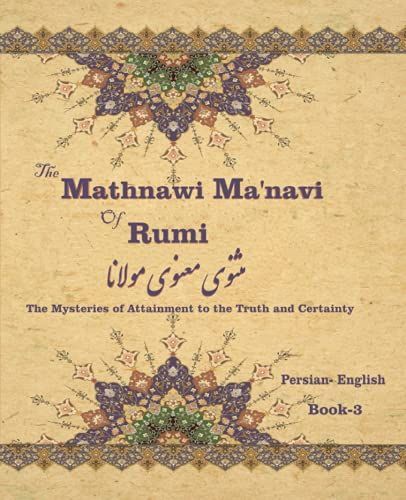
The Mathnawi Maˈnavi of Rumi, Book-3 The Mysteries of Attainment to the Truth and Certainty
One of the Greatest Persian Classic Book نه نگویم زانک خامی تو هنوز در بهاری تو ندیدستی تموز این جهان همچون درختست ای کرام ما برو چون میوههای نیم خام Nay, I will not tell (it), because thou still art unripe thou art in (thy) springtime, thou hast not seen (the month of) Tamúz. This world is even as the tree, O noble ones we are like the half-ripened fruit upon it. Mathnawi Maˈnavi (also known as Masnavi or “Spiritual Couplets of Maulana”) is one of the most influential works of both Sufism and Persian literature. The Masnavi, written by Jalal al-Din Muhammad, Rumi is a series of six books of poetry containing more than 25,000 verses. This spiritual writing teaches Sufis how to reach their goal of being in true love with God. Rumi is one of the best Persian poets and the Mathnawi is his masterpiece. Rumi used Persian and Arabic in his poetry. By the end of the 20th century, Rumi’s popularity had become a global phenomenon, with his poetry achieving a wide circulation in the United States and western Europe. His poems have been translated into many different languages including Turkish, Urdu, French, Turkmen, Spanish, English, Arabic, German, Italian, Albanian, Swedish, etc. Reynold Alleyne Nicholson's translation of Mathnawi is based on the oldest known manuscripts. The prose translation, similarly, is intended to be an exact and faithful guide to the Persian. In Book, the third of six volumes, it intertwines amusing tales with homilies to teach pupils in the understanding of God's meaning. It has a special focus on epistemology, explained with narratives that involve the consumption of food. We are very happy that the Mathnawi Maˈnavi of Rumi has found its way to you! Published By: Persian Learning Center www.persianbell.com